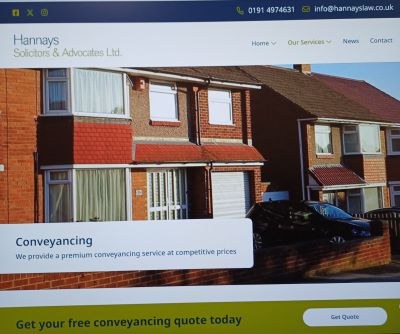Conveyancing Scam – Deposit Redirection Fraud
On television news, in newspapers and online there is reporting of an online scams known as ‘deposit redirection fraud’, that could affect you when buying and selling your home.
It happens when scammers hack into a persons email and they wait until money is about to be sent to the solicitor for a property purchase and then redirect the funds to their own bank account by sending an email which looks as if it is from the solicitor.
This worries us here at Hannays Solicitors as we don’t want our clients to have any problems with this type of scam.
What is Deposit Redirection Fraud?
This scam occurs when a computer hacker monitors electronic communications (usually email) between a client and their solicitor.
The computer that is hacked is the one that the client uses.
The scammers place unsuspecting malware on the client’s computer that lies dormant until it can pick out key words.
The malware watches out for any key words associated with buying or selling a property, especially keywords associated with requesting funds for the payment of a deposit or the funds to complete a purchase of a house.
Then the scammers make their move.
They then hack into the email account on the computer and contact the client disguised as the solicitor’s firm.
The scammers usually inform the client that the solicitor’s bank account has changed and give the client new details.
The client thinks nothing of this request and when it is time to send their deposit or funds to the solicitor they send it to the hacker’s bank account instead.
If you think about the value of a house purchase the amount the scammer can get away with can run into thousands – anything from a couple of thousand pounds deposit to the full price of a property if the client is a cash buyer.
How to protect yourself
It’s not always easy to tell if your device has been infected with malware and you should check your computer frequently with specialised anti-virus/ anti-malware software that you should install on your PC/phone/IPad etc., before using any device for your personal banking.
You should ensure that you are using a good anti-virus software which runs constantly in the background and ensure your firewall is enabled.
Run your anti-virus software at least weekly and ensure that you update it frequently.
Look out for a little lock near to the URL when you are using websites as this indicates that they are safe to use.
Remember android phones can become infected with malware so you should also install anti-virus software on your phone.
Set up your PC to automatically download operating systems browser and software updates automatically.
We don’t do any of our financial transactions via our website so if someone asks you to log in to our website to make a payment you know they are trying to scam you. In reality they will be asking you to log in to their website which is definitely not a safe thing to do.
How we try to keep to you safe
Obviously we can’t take responsibility for your home computer or other device but there are some things that we do to try to keep you safe;
- We won’t ask you for any funds via an email and won’t provide any links in any emails for you to click on to make payments.
- Also, we won’t accept your bank details by email. This prevents us from sending money to a bank account that may not be yours if your computer has been hacked. We ask you to give us your bank account details at the outset in writing and those are the details we will use to send funds to you, unless you in person change those bank accounts details with us in writing.
Our conveyancers will either write (in a letter) or give you our bank details verbally in person – if anyone tries to give you different bank details by email please contact us immediately by phone – you should be very cautious.
If you ring us and don’t feel sure that it is your conveyancer speaking to you please run some checks – ask your conveyancer some questions about your transaction that only he/she would know or come in to our office in person. Get our telephone number from the letters we write to you and not from any links via email that may have been sent to you.
Also, please remember if you have any doubts about sending large amounts of money to us when you are buying a property or with any other transaction you can always send us £1 to test that you have the correct bank account details. After transferring the £1 call our office to ensure that we have received the £1. If we confirm you can then proceed to send the balance of the funds knowing you have the correct bank details.
You can ask your bank to help you to send the funds rather than you doing it from your phone or home computer.
If you don’t want to send us funds electronically please remember that you can always ask your bank to issue a bankers draft (which is like a cheque) or pay by cheque. These methods of shifting funds take longer to clear into our account but they are very safe.
 We are now offering our clients the added protection of using the Safe Buyer Scheme https://www.safebuyerscheme.co.uk/ to enable our clients to check our bank account details. Your conveyance can explain how the Safe Buyer Scheme works and there is a small charge to pay directly to the Safe Buyer Scheme for using their service.
We are now offering our clients the added protection of using the Safe Buyer Scheme https://www.safebuyerscheme.co.uk/ to enable our clients to check our bank account details. Your conveyance can explain how the Safe Buyer Scheme works and there is a small charge to pay directly to the Safe Buyer Scheme for using their service.
Please remember
- We will never send you a last minute email informing you that our bank account details have changed
- We never deal with bank account details by email and you should not send us your bank account details by email
- You need to be vigilant and treat email communications as suspicious whenever the emails deals with the transfer of monies
- If you are not sure about anything talk to your conveyancer directly
- Face to face communication is the most secure way of communicating
- You can never be too careful when there is a lot of money at stake
- We don’t mind you contacting us at any time regarding your conveyancing transaction.
Call our conveyancers on 0191 4555361 if you have any concerns during your transaction.





